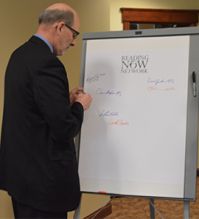West Michigan instructional leaders will soon begin visiting schools, talking to principals and teachers to answer a critical question: “What strategies work best in teaching students to read?”
This is the groundwork of Reading Now Network, a collaborative effort to boost third-grade literacy to 80 percent (or more) in the 13 counties of West Michigan. Superintendents and representatives of the business consortium Talent 2025, which is supporting the initiative, recently gathered to kick off the Reading Now Network in a Press Conference at Kent ISD.
These school visits and data-gathering make up the field study to identify the reading programs and teaching strategies that work best. Curriculum experts will compile data from schools where reading achievement is high, despite traditional learning barriers like poverty and high percentages of students who speak English as a second language.
These experts will begin sharing early results from this field study this fall, and next year, the research will be used to train teachers how to use the best strategies and programs to benefit the students in their own schools.
“We will be taking strategies that are working from all these schools. We’re taking the commonalities and studying them,” said Dorothy Vanderjagt, Kent ISD director of teaching and learning.
Joining Forces
The Reading Now Network involves 70 West Michigan school districts spanning 13 counties working together to increase third-grade reading proficiency levels to 80 percent in five years, say educators.
Results will be shared at a fall 2014 Reading Now Summit. A spring 2015 Reading Now Symposium will instruct teachers and administrators on teaching techniques and strategies that are exceeding expectations. Counties include Allegan, Barry, Ionia, Kent, Lake, Mason, Mecosta, Montcalm, Muskegon, Newaygo, Oceana, Osceola, and Ottawa.
State Superintendent Mike Flanagan, in a video address, said the approach could become a model for the whole state.
“Literacy is so important for our kids, our state and ultimately for our country,” he said. “This is maybe the one issue everyone can agree on.”
Research shows students not reading well by the end of third grade are more likely to drop out of high school and are far less likely to earn a living wage as an adult, according to the report “Double Jeopardy: How Poverty and Third-Grade Reading Skills Influence High School Graduation,” commissioned by the Maryland-based Annie E. Casey Foundation.
That’s a problem for everyone, said superintendents who pledged to work together in sharing their best instructional practices. Creating a non-competitive culture among schools will help reach the goal.
“What this represents is the acknowledgement of these superintendents that on this topic we will not compete,” said Karen McPhee, Ottawa ISD superintendent. “They’re all our children.”
“Instead of sitting back, we need to take some real action steps,” said Wyoming Public Schools’ Superintendent Tom Reeder, Region 3 president for the Michigan Association of School Administrators. “One thing we shouldn’t compete over is getting children to read.”
Gathering Information
The fieldwork begins this month. Instructional leaders are visiting area schools that are achieving high levels of third-grade reading proficiency. Of 14 schools within the region significantly outperforming expectations, they plan to begin by visiting: North Godwin Elementary in Godwin Heights Public Schools,Brown Elementary School in Byron Center Public Schools, Palmer Elementary in Grand Rapids Public Schools, Lakeshore Elementary in West Ottawa Public Schools and Sunfield Elementary in Lakewood Public Schools.
 In West Michigan’s Region 3, 67.84 percent of students scored proficient on reading portion of the MEAP test in Fall of 2012. Statewide, that number was 66.5 percent. The region as a whole has improved from 61.17 percent proficient in 2008-2009. Many schools within the region exceed the 80 percent goal, but none of the counties as a whole are above 80 percent.
In West Michigan’s Region 3, 67.84 percent of students scored proficient on reading portion of the MEAP test in Fall of 2012. Statewide, that number was 66.5 percent. The region as a whole has improved from 61.17 percent proficient in 2008-2009. Many schools within the region exceed the 80 percent goal, but none of the counties as a whole are above 80 percent.
Grand Rapids Public Schools Superintendent Teresa Weatherall Neal said it’s an exciting and long overdue initiative.
“It doesn’t matter where you start out. It doesn’t matter your zip code or what language you speak. Socioeconomics is not an issue. This is where we will help you get to,” she said. “We are one community. We are powerful. We want to do this.”
CONNECT
Superintendents Join Forces to Improve Regional Reading Scores








